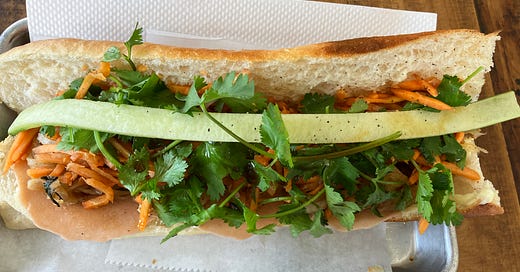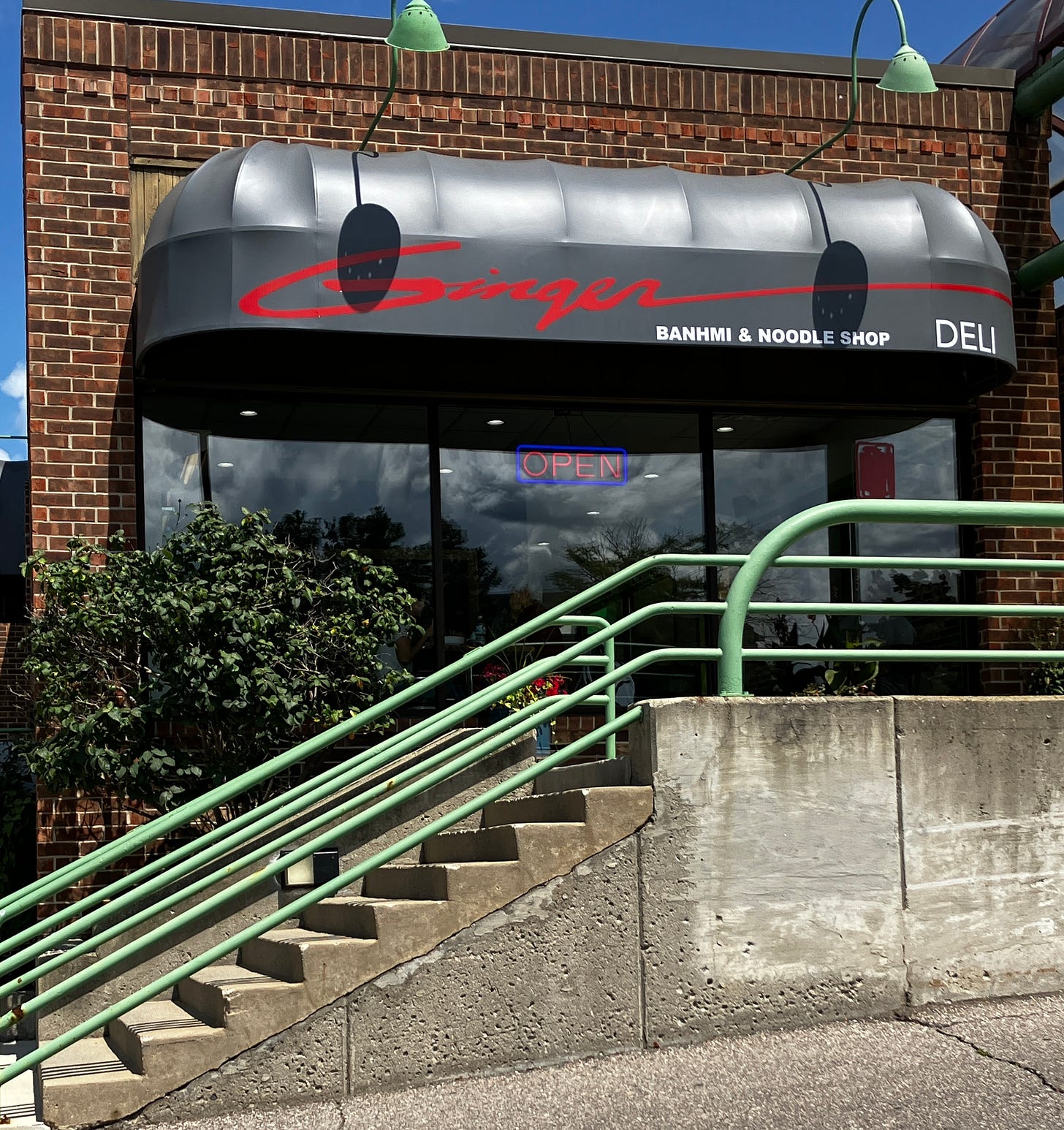A Small Business Grows Despite The Food World's Challenges
Immigrant Te Phan expands his Vietnamese restaurants
Welcome to this week’s CulinaryWoman Newsletter! I had a busy week of story assignments (you’ll find links to them at the end of the newsletter).
I sent out a Note on Substack last week, but in case you missed it, I am bumping up the price slightly for monthly paid subscribers. The annual price remains the same.
If you became a paid subscriber before the price increase, you will continue to pay that price and you will renew at that price, too.
I increased the price for a couple of reasons: one, I discovered that I was asking much less than other people on Substack and two, I’d really like to encourage people to sign up for annual subscriptions. It’s a much better value for you, and it allows me a more-reliable income stream.
Of course, free subscribers will continue to be free, and thank you if you are among them.
Speaking of business matters, I have an inspiring restaurant growth story to share this week.
From Vietnam To A Growing Restaurant Business
From 2020 until 2022, I wrote the Marketplace Changes column in the Ann Arbor Observer, our monthly magazine. I tracked every significant new business that opened and those that closed. Each month, I tried to feature four newcomers, which meant I’ve met a lot of small business owners around town.
One of those people is Te Phan (his first name is pronounced Tea). He and his family were refugees from Vietnam in 1983 whose arrival in America was sponsored by a church in Holland, Mich. He came at age 10, subsequently studied classical piano at Hope College and design at the Cleveland Institute of Art. Eventually, he became an industrial designer at Ford Motor Company.
Switching careers, Te became an importer of products for hospitality clients, like hotels and events spaces, which led him to open his first business, Ginger Deli, in 2014. Te used recipes from his mother for pho, the hearty Vietnamese noodle soup, and banh mi, which are sandwiches built on crusty French bread.
Te initially worked from a walk-up stand, and then opened a second location inside the University of Michigan hospital. When I met him in late 2020, he was finishing the menu for a brick-and-mortar Ginger Deli on Liberty Street in downtown Ann Arbor.
I wrote about him for the Observer in January 2021, and moved to New Orleans a year later. Even as I dined in New Orleans’ numerous Vietnamese restaurants,however, I had warm memories of his dishes.
Earlier this summer, I heard that Ginger Deli had expanded to a second location. On a hunt for lunch last week, I decided to stop in. Te was running the front counter and gave me a warm greeting — as well as a surprise.
When the original Ginger Deli opened in late 2020, the Covid pandemic was near its peak. Although restrictions on indoor dining were loosened, many diners still stayed home. As a result, Te earned only around $20 a day “or maybe not even that,” he said. A good day brought $50 to $100 in revenue.
After my article ran in January 2021, “it got better and better,” Te told me. Customers mentioned the story and told him the deli looked exactly as I’d described it.
In subsequent months, he added dishes to the menu, picked up catering business around Ann Arbor, and provided grab and go products to local markets such as Argus Farm Stop (I always take home his papaya salad when I spot it).
By 2022, he was able to pay himself a salary for the first time in eight years in the food business. I was taken aback that my story had meant so much to his business — to be honest, I was almost in tears.
Journalists often hear far more complaints about their stories than compliments. It’s rare that someone explains exactly what your writing meant to their life, so I was truly touched.
An accidental expansion
His new location was something of an accident. For months, Te drove by an empty location in a collection of businesses called the Courtyard Shops. They face busy Plymouth Road, a short walk from the university’s north campus. He learned from a mutual acquaintance that Sonny Chapel, who owns a pharmaceutical consulting firm, planned to open a restaurant on the side.
Te reached out and met with her several times. He could see that she was becoming overwhelmed by her lack of restaurant experience, despite her love of food. “It’s like when you read a book, and then you see the movie. It’s totally different,” he said.
Last winter, she unexpectedly gave him the key and told him to do whatever he wanted with the space. Despite having signed a two-year lease, she was leaving for California and would not be back for months.
“I came in and sat here for like an hour” absorbing the news, he said. “And then I said, ‘well, if we don’t do anything, nothing will come of it."‘ Although he hadn’t planned to open a second restaurant, “the opportunity meant I had to try.”
Thankfully, the space did not need renovations and he only had to make some adjustments in the kitchen.
A little bit everywhere
He’s still figuring out his strategy for the location. His neighbors include a bookstore, boba shop, Indian, Thai and pizza places, and an upscale cake and pastry shop. A Taco Bell is also being built nearby, to the chagrin of some foodies.
“I want to do everything very organically and very real,” Te told me. “We have to invest in one customer at a time.”
He would be happy to attract 50 customers a day. I think he has a good chance of doing so. Along with the university, the vicinity is home to a number of Asian residents, who walk daily to a nearby Asian grocery store, as well as Chinese and Korean-owned restaurants.
Once U-M students return to classes next week, he plans to stay open into the evening, and add items that can serve as dinner, such as a rice bowl topped with grilled meat. I’m hoping he’ll add desserts to the lineup (he says his mother makes a killer tofu pudding with ginger sauce).
The key to future success, he says, will be figuring out how to make the new business stay afloat. “I don’t have any rich friends” who can be angel investors, Te jokes. “What I can say after 10 years of doing this is that you have to grow roots.”
He’s looking for more stores around town that can carry his dishes, as well as his own restaurants. “Whichever place you can get your hands in.”
Ann Arbor has a track record of supporting new businesses and sustaining those that meet the community’s needs.
This weekend marks the one-year anniversaries of Socotra Coffee, the Yemeni-owned coffee and pastry shop, and Raterman Bread, a bakery and cafe run by bread baker Nick Raterman. It’s also the 10-year anniversary of Argus, which like Ginger Deli has expanded to multiple locations.
Te knows that running a new location in addition to his existing business will require long hours. But he’s willing to put in the time.
“To be in this kind of business, you have to love it,” he says. “Because if you don’t, there’s no way a person can make it.”
Hurry Up And Eat
During the pandemic, a number of restaurants limited the amount of time that diners could keep their table. They only had enough staff to keep things going, and various restrictions meant they could not serve as many guests.
In most places, the need to turn tables has eased. But not in New York City. New York Magazine reports that restaurants there are limiting diners to the use of a table for about 90 minutes.
Servers and hosts have become skilled in moving people along. They’ll present the check along with dessert, and they’ll approach lingerers to tell them that their table is needed.
The practice is understandable, but it doesn’t seem very hospitable. Some might find it downright rude compared with traditions in parts of Europe. There, tables are considered a guest’s for the evening, and there’s no effort to rush anyone out.
But given the high costs of running big city restaurants, which I talked about last week, this hurry up and eat philosophy is no surprise. Just be prepared in case you see a staff member looming: it means your time has expired.
Out: A Pint Before A Flight. In: Zero Alcohol Drinks
According to The Guaradian, a breakfast pint at the airport is as much a part of the typical British holiday as third-degree sunburn and overindulging at all-inclusive resorts.
At least it was. As zero-alcohol beer becomes more widely available, and travelers become more health focused, that practice is falling in popularity.
Figures from Manchester Airport Group (MAG) show a five fold increase in sales of non-alcoholic beers at some of its bars and restaurants.
Sales of vegan breakfasts and brunches also have grown more than 20 percent in the same period at Manchester, Stansted and East Midlands airports overall since last summer.
Younger travelers are downing smoothies and probiotic drinks before their flights as well. “We’re going on holiday and there’s going to be a lot of drinking there, so we just didn’t want to get too tipsy. We’ve had our uni days,” said Aneesha Jhanji, enjoying an iced coffee before her holiday to Turkey with her friend, Joel Hutchinson.
It doesn’t spell the end of airport drinking, by any means, but perhaps it will take place later in the day.
Keeping Up With CulinaryWoman
I had a really busy week and have lots of links to share with you.
For Food & Wine, I looked at the massive merger between Mars and Kellanova, the former snack division spun off by W.K. Kellogg. There is a revolution underway in snack flavors, and this could amp up competition.
Another Food & Wine story explored the narrowing gap between fast food and fast casual brands. It explains why you’re seeing so many competing meal deals and why you can find so many bargains on restaurant apps.
My editor at the Boston Globe suggested that I look at all the ways communities are fighting speeding. I found that the old-fashioned way - cops on the road - is the most effective, but that’s not as simple as it sounds.
Our classic film podcast Lions, Towers & Shields talked about the 1966 movie, King of Hearts, which is now considered an standout anti-war film.
Send me an email if you’d like to get in touch. I can be reached at culinarywoman (a) gmail dot com.
Tomorrow, I’ll be back with Red Beans & Advice for our paid subscribers. I’m looking at a trend that’s been picking up in recent times: photo opp farms. I’d love to know if you’ve been to one.
Have a good week.









